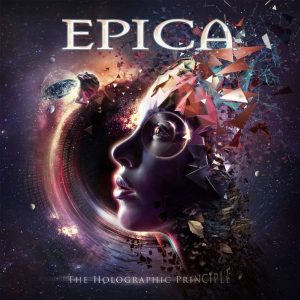 The cultish devotion to contemplating endless variations of Descartes’s “evil demon” question mixed with Hume’s ridiculous skepticism has led some philosophers to seriously contemplate if saying “I have hands” is a valid assertion because we can’t definitively prove that we’re not just brains in vats (BIVs) imagining the whole world, our hands included. Somehow this line of thought is still taken seriously, and it’s given us plenty. It’s given us proof positive that if your philosophy abandons Aristotle and Aquinas, it’s going to be terrible. It gave us The Matrix; a good action flick. It’s also given us a record based around wondering whether our world is actually just an elaborate VR simulation in the form of Epica’s The Holographic Principle.
The cultish devotion to contemplating endless variations of Descartes’s “evil demon” question mixed with Hume’s ridiculous skepticism has led some philosophers to seriously contemplate if saying “I have hands” is a valid assertion because we can’t definitively prove that we’re not just brains in vats (BIVs) imagining the whole world, our hands included. Somehow this line of thought is still taken seriously, and it’s given us plenty. It’s given us proof positive that if your philosophy abandons Aristotle and Aquinas, it’s going to be terrible. It gave us The Matrix; a good action flick. It’s also given us a record based around wondering whether our world is actually just an elaborate VR simulation in the form of Epica’s The Holographic Principle.
While I could argue that The Holographic Principle might not actually be real according to its own logic because neither I nor Epica themselves can demonstrate that Epica even has hands, I won’t because I’ve somehow not been fired for gross insubordination yet [Leave the vat! – Steel Druhm]. So, take Nightwish’s general sound, mix it with Dimmu Borgir’s Abrahadbra for more symphonic and metallic cheese, and throw in a few more “progressive” elements (read: longer songs with more detailed midsections and/or extended introductions that stick to the general verse-chorus-verse format), and you’ve got a good idea of what to expect in sound here.
Continuing what must look like a dauntless effort to torpedo my metal cred, I’ll say that I enjoy what Epica is doing here. “Universal Death Squad” and its Terminator-inspired lyrics make for a good cheeseball arena metal tune with solid hooks and satisfying climaxes in just the right places. The energetic “Edge of the Blade” is meticulously crafted to keep the listener engaged and entertained, and succeeds at both handily. The quasi-Eastern flair of “Dancing in a Hurricane” reminds of Blind Guardian (“Wheel of Time”) and Wintersun (Time I), and while it’s more in line with blockbuster soundtracks than metal it’s a good piece of music nonetheless. Vocalist Simone Simons puts on a gorgeous performance in “Once upon a Nightmare” that carries the song, elevating what would be average lactose-laden balladry into a quality tune. “A Phantasmic Parade” is concise, catchy, and builds its chorus hook around the operatic vocals, a successful and memorable use of Epica’s favorite embellishment.
The Holographic Principle is one of the least guitar-driven metal records I’ve heard in my entire life. The primary focus of Epica’s compositions is Simons’s voice, the secondary focus is symphonic keyboard embellishments, and guitars occupy tertiary territory. Given that Epica is at their best when shooting for total sensory overload, the guitar-led verse of “Beyond the Matrix” sounds like an audial loading screen for the bombastic chorus instead of an integral part of the song, and it’s easy to forget that guitars are actually involved when said chorus occurs. Epica’s song structures are relatively basic, and in turn the band is best off when they’re concise or keep a consistently high level of quality throughout a song. “Divide and Conquer” has the usual nice, catchy, and uplifting chorus, but at nearly eight minutes long it spends too much time on too few ideas, being composed of an extended soundtrack-style intro, a verse, a chorus, and a bridge in two relatively inconsequential parts. “The Cosmic Algorithm” is the most straightforwardly “metal” track here and consequently the weakest part of The Holographic Principle. It sounds like slower second-rate power metal with pretty vocals over top and the odd growl thrown in, doing nothing of note for five minutes straight. To the surprise of nobody, The Holographic Principle is hyper-modern and sterile in production, which works for Epica. Everything can be heard, but preference is given to vocals and symphonic noodling. The guitars sound much better behind the usual layers than on their own, so the efforts to play heavy riffs a la carte don’t often pay off.
The Holographic Principle is an entertaining exercise in excess, a well-done weekend blockbuster in musical form. It’s going to repulse the pretentious, appear as an amazing display of art to dabblers in the genre, and be an accessible yet moderately enjoyable listen to most others. Epica’s good at what they do, which is making grandiose and fun soundtracks for lengthy adventure films that don’t exist with a competent metal band bolstering the whole affair. I was entertained and satisfied after each listen to The Holographic Principle, content that I hadn’t wasted my time, but found myself wishing that I was further enthralled by the whole affair.
Rating: 2.5/5.0
DR: 6 | Format Reviewed: 277 kbps mp3
Label: Nuclear Blast Records
Websites: epica.nl | facebook.com/epica
Releases Worldwide: September 30th, 2016

















